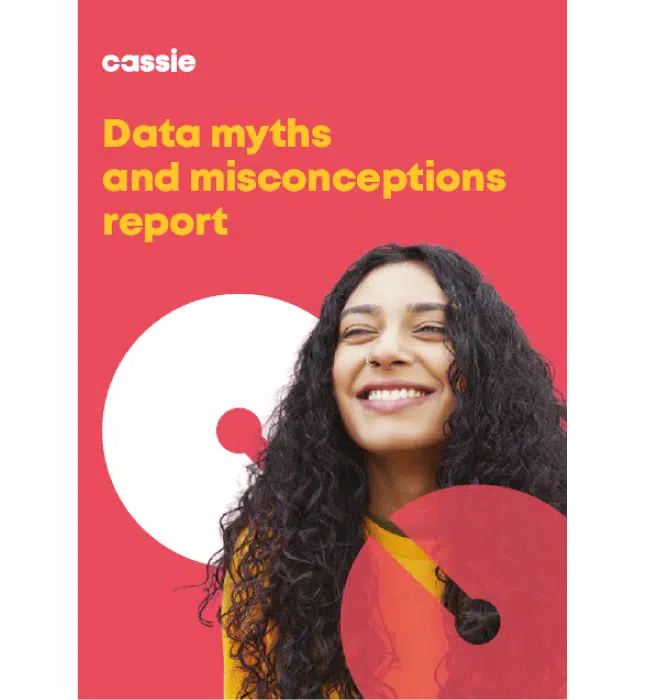Compliance
CCPA
CCPA (California Consumer Privacy Act) has dramatically improved the lives of California citizens, giving them stronger data rights and more protection.
Cassie’s consent and preference management platform enables businesses to build customer trust and comply with all relevant regulations without needing to sacrifice business goals.

The California Consumer Privacy Act, (CCPA), is the most robust data privacy law in the United States of America. Its goal is to give Californians more control over their personal information by granting them a number of fundamental rights.
Inspired by the EU’s General Data Protection Regulations (GDPR) which was adopted in 2018, the CCPA was signed into law in 2018 but later came into effect from Jan 1, 2020. Following this, the California Privacy Rights Act (CPRA) was brought into effect from 2023 and focuses on strengthening the framework by including additional privacy protection for consumers.
Why choose Cassie for CCPA compliance?
The majority of consent management platforms (CMPs) offer templated solutions to allow compliance for relevant legislations. However, this does come at the cost of your business rules and objectives. Cassie’s CMP is highly configurable, meaning that you’re in control and we work around you so that you can meet these regulations without jeopardizing your business goals.
Protect individual privacy
Allow end users to take control of their preferences with granular consent controls enforced across domains, devices and platforms
Avoid fines and brand damage
Cassie enables organizations to meet the complex requirements of CCPA and mitigate risk with a robust framework for managing consent, avoiding severe penalties and reputational damage
Pass audit inspections
Ensure data security
Cassie is SOC 2 certified, assuring organizations’ data is safeguarded from unauthorized access or breaches with industry-leading encryption protocols and practices
Complex consent made simple
For every consent captured, Cassie can store unlimited key value pairs of additional information against those consents to unlock scalable, granular consent management
Centralized source of truth
Use Cassie to honor and enforce consent data via APIs and integrations at high volume, in real-time for CCPA compliance across your tech stack (CRMs, CMS, marketing automation tools, BI tools)
The benefits of CCPA compliance software
Stay compliant
CCPA compliance software can help you keep your business compliant with the latest regulations. This is especially important when it comes to data privacy and security, as these regulations are constantly evolving. With a comprehensive tool that keeps up-to-date with the most recent amendments, you can ensure that your business remains compliant and avoids any potential penalties or fines.
Streamline data processing
CCPA compliance software can help you streamline your data processing procedures, making them more efficient and secure. With a detailed audit trail of all the activities performed within the system, you can easily track any suspicious activity, identify breaches in security, or detect any other potential issues that could affect customer privacy.
Improve customer experience
By using CCPA compliance software, you can provide customers with better protection and confidence when it comes to their data privacy. This helps build trust between them and your brand while also creating an overall positive experience for your users – both of which benefit your business in the long run. Furthermore, this software can also help reduce time-consuming tasks such as documentation and forms, leading to a smoother experience for everyone involved.
Cost savings
Many businesses find that deploying a CCPA compliance software solution is more cost-effective than manually managing customer data. Compliance software can help automate the process of collecting and storing data, reducing manual labor costs and freeing up resources to focus on other areas of your business.
Automation
Automating customer data processes with a CCPA compliance software solution helps save time and effort for both customers and businesses alike. It ensures that all customer data is collected accurately and securely, eliminating any potential for human error or malicious activity.
Enhanced security
An advanced compliance software solution will provide additional security measures such as encryption, two-factor authentication, monitoring services, and more to ensure that customer data remains safe.

Download our ‘data myths and misconceptions’ research report
Read our ‘data myths and misconceptions’ report to build an understanding behind why the majority of U.S consumers are wary about the security of their online data. This report covers:
- Whether or not U.S. consumers find the most popular data protection measures to be effective
- How aware consumers are in regards to the personal information that can be collected by companies
- If consumers keep up to date with data privacy legislations
- How companies can build customer trust by respecting data and being transparent with consumers
CCPA compliance FAQs
-
What are the most important data privacy rights consumers have under CCPA ?
-
Consumers have the following rights under CCPA:
- The right to know
- The right of access
- The right to delete
- The right to opt out of the sale of personal information
- The right to non-discrimination
-
Consumers have the following rights under CCPA:
-
How can I achieve cookie compliance under CCPA?
-
1. Review your cookies and collected data
The first step is to review all cookies that you are using on your website and any other data points collected through third-party services. You should identify what type of information each cookie collects, and how it is used. This will help you determine what needs to be done to comply with the CCPA’s notice requirements.2. Manage user consent for cookies
Once you have identified which cookies need consent from users, you can set up a consent management system that allows users to provide clear affirmative consent before any non-essential cookies are deployed on their device. This includes providing an appropriate disclosure explaining what cookies are being used and how they will be used.3. Provide an easy opt-out process
The CCPA requires businesses to provide users with a simple way to opt-out of non-essential cookie tracking on their device. This typically involves providing an option for users to withdraw their consent or disable the use of certain cookies at any time.4. Audit your systems regularly
It is important that you regularly audit your website’s cookie compliance processes to make sure that all requirements are being met. This should include reviewing all third party services that may place cookies on user devices and making sure users have properly consented before these cookies are deployed. By auditing your systems regularly, you can ensure that your website remains compliant with the CCPA. As you can see, achieving cookie compliance under the CCPA involves several steps and requires careful adherence to the regulations in order to remain compliant. Following these steps will help keep your website in compliance so that both users and businesses are protected.
-
-
What are risks of non-cookie compliance under CCPA?
- Under the CCPA, failure to properly implement cookie compliance could result in significant fines. The CCPA has a private right of action that allows individuals to collect up to $750 per violation if their privacy rights are violated or their data is misused. Additionally, any business found to be in willful non-compliance with the CCPA may be subject to administrative or civil fines of up to $7,500 for each violation. Therefore, it is essential that organizations comply with the CCPA and ensure their use of cookies meets all requirements set forth by the law.
-
What are the benefits of cookie compliance under CCPA?
-
Cookie compliance under CCPA can provide a number of benefits, including:
- Increased customer trust and loyalty by demonstrating that you are taking measures to protect their data.
- A reduction in legal risks associated with non-compliance.
- Easier access to targeted marketing opportunities, as cookie technology can give companies a better understanding of their customers’ preferences.
- Improved website performance and visitor engagement, since cookies allow pages to load faster by retaining key information from previous visits.
-
Cookie compliance under CCPA can provide a number of benefits, including:
-
What do CCPA compliance solutions do?
-
Data discovery and mapping
CCPA compliance tools help organizations locate and identify all the data they process, both online and offline. Once the data has been discovered, it needs to be mapped to understand where it’s being stored, who has access to it, and how it’s being used. This is a critical first step towards achieving CCPA compliance, and CCPA compliance tools can help simplify this process.Consumer requests management
One of the key provisions of CCPA is empowering consumers with certain rights over their personal information. CCPA compliance tools automate consumer requests management by enabling businesses to manage requests online. Customers can make requests like to access their data, delete their data, and opt-out of data sales through easy-to-use web forms on a company’s website.Consent management
Under CCPA, businesses must obtain consent from consumers before collecting their data. CCPA compliance tools can help automate the consent management process by enabling companies to collect and manage consumer consent through online portals. By automating this process, companies can ensure that they are only collecting and using data lawfully.Data protection
CCPA compliance tools can help organizations protect consumer data by automating breach notification processes. In the event of a data breach, CCPA compliance tools notify impacted individuals as soon as possible and ensure that the appropriate government agencies are notified.Governance and documentation
CCPA compliance tools assist businesses in meeting their regulatory requirements by maintaining documentation on their compliance activities. They generate reports that help demonstrate compliance with CCPA requirements, providing assurances to stakeholders that the business is taking appropriate privacy measures.
-
-
How does CCPA impact businesses?
- The CCPA is a groundbreaking law that marks a major step forward in giving California residents control over their personal data. It requires businesses to take proactive measures to safeguard personal information and be transparent about how it is being used. As businesses face mounting challenges in maintaining compliance, it is essential to keep up with the CCPA requirements as they may evolve over time. Businesses must prioritize privacy compliance to protect their brand reputation and remain competitive in the marketplace.
-
What is CPRA compliance?
- CPRA stands for the California Privacy Rights Act, which is an extension and amendment to the California Consumer Privacy Act (CCPA). CPRA was passed as a ballot initiative in November 2020 and further strengthens consumer privacy rights and protections. In relation to CCPA, CPRA introduces additional requirements and provisions that businesses need to comply with. The main purpose of CPRA is to enhance and expand privacy rights for California residents and to establish more stringent obligations for businesses handling personal information. It's important for businesses subject to CCPA compliance to be aware of the changes introduced by CPRA and ensure they meet the updated requirements. This may involve revisiting data management practices, implementing additional security measures, and reviewing privacy policies and procedures to align with the enhanced consumer rights and obligations outlined in CPRA.

